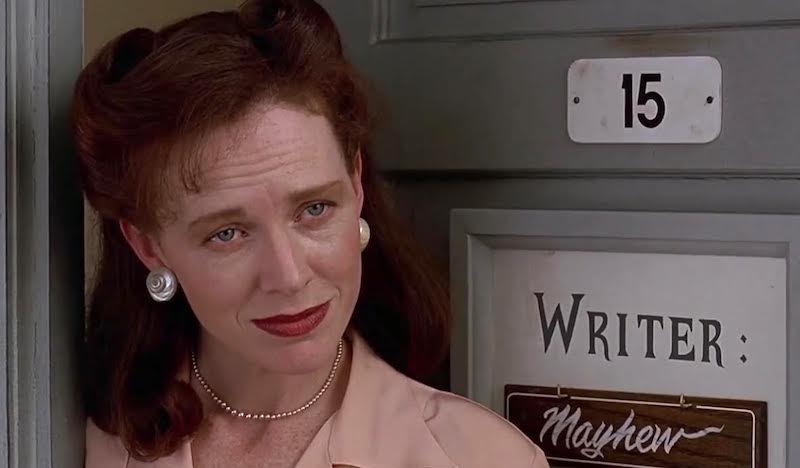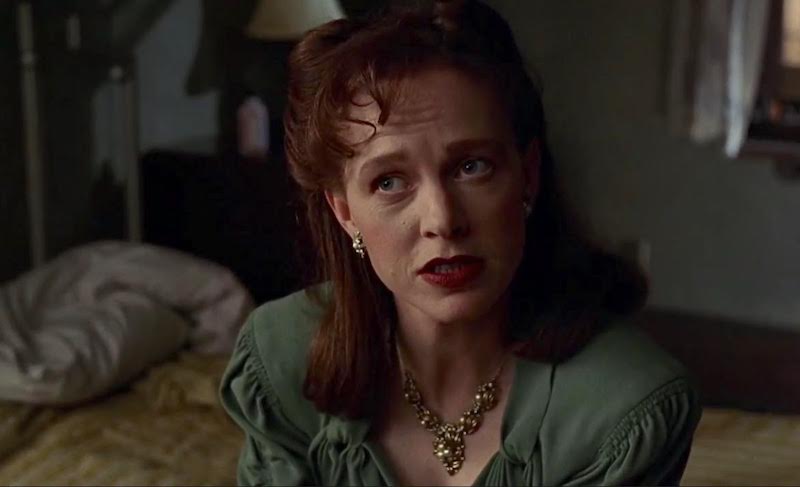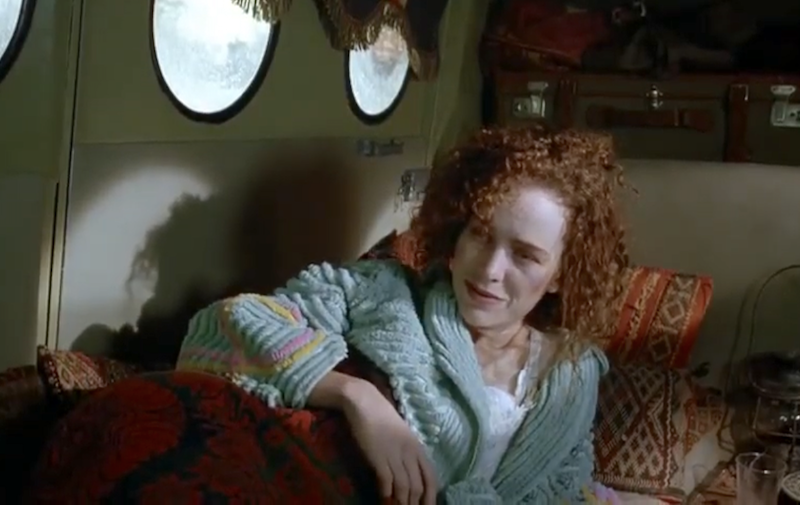Before each Smackdown, Nick Taylor looks at possibilities for an alternate ballot...

Barton Fink and Naked Lunch are two 1991 films with more in common than you'd expect. Both follow writers - one a lifelong devotee of the trade, one quite new to it - who are suddenly plucked from their old lives and dropped into entirely alien worlds, with few reliable sources to guide them. Both tackle the incredibly mundane ache of loneliness and toil of their work, albeit against obstacles like axe murderers and global drug conspiracies. Both are directed by major auteurs and styled to the fucking nines, making their settings as accessible as they need to be while fulfilling some impenetrably strange narrative conceits. And both serve as vivid showcases for the talents of Judy Davis, 1991’s NYFCC winner for Best Supporting Actress, who unfussily acquits herself to two very different, aesthetically demanding milieus. Her brainy, abrasive persona and preternatural expressiveness are cannily utilized in both films, and Davis emerges as an essential element of their respective successes despite her minimal screen time...
Barton Fink
Set in 1941, Barton Fink stars John Turturro in the titular role of an anxious young Broadway writer whisked off to Hollywood almost immediately after his newest play debuts to revelatory reviews. Fink isn’t particularly excited to write for the pictures, having already set his sights on reinventing the grammar of theatre itself in order to create the next great American Epic about the common man, for the common man, despite being chronically incapable of interacting with said common man. At the very least, he’ll receive a steady, handsome income and a chance to further hone his craft. Granted, a Wallace Beery wrestling B-movie may not be the best venue for exposing the soul of blue-collar America, but Fink’s inability to start writing the script is a much bigger problem than the cliched material he’s been given. Even worse is the litany of studio bigwigs and fellow writers who should ostensibly be able to give him some kind of help but only leave him even more baffled about how to do his job.

Audrey Taylor (Judy Davis) is something of an exception to most of the folks running around Barton Fink, not just sympathetic to Fink’s plight but arguably the only character in the film the Coens’ seem interested in getting the audience to like. Sporting a Southern drawl and a Scarlet O’Hara wig, Davis spends her first scene standing in the doorway of her nice apartment, apologizing to Fink on behalf of her boss/lover W.B. Mayhew (John Mahoney) and informing him he isn’t sober enough to keep up their lunch date but should be able to meet with him in the next few days. Taylor is candid about Mayhew’s vices, regarding it as a typical part of his behavior while downplaying its extremity even as he sounds like he’s destroying their house. Davis plays Taylor with the self-awareness of a woman too smart not to see the damage Mayhew's alcoholism is wreaking on the both of them but still obedient to whatever ideals of Southern obligation and romantic yearning have kept her by his side for all these years. I can’t imagine Davis being anyone’s first choice for a meek Southerner, yet she’s magnetic to watch as she explains the troubling dynamics between her and Mayhew to an increasingly shattered Fink.
Her third scene culminates with a pretty major revelation about her work for Mayhew and a tender step forward in her relationship with Fink, making it an even bigger shame she’s axed from the film almost immediately afterwards. Even for a film about stifled potential and sudden disappointments, her removal from Barton Fink feels more like a missed opportunity to explore the character further. Her particular form of suffering is singular even among the Coens’ pantheon of losers, and I wish they’d given her a real arc to play out instead of cutting it short at her biggest secret.
Naked Lunch
For all Fink’s surrealist flourishes and everyday manias, it’s amazing how Naked Lunch is, by several degrees, the weirder movie of the two. Loosely based on the novel of the same name by William S. Burroughs and the events in his life that inspired its creation, the film takes place in a version of 1950's New York very removed from our known reality. Our hero is William Lee (Peter Weller, whose elastic deadpan is an effective foil for Cronenberg’s oddities), an exterminator who finds himself suddenly swept up in a major global conspiracy. Lee is quick to frame this development as a hallucinogenic side effect of his newfound addiction to the bug powder he uses to kill cockroaches, having recently picked up the habit from his wife Joan (Judy Davis). but if you were summoned to a police station by a talking, anatomically unique, pug-sized beetle, you might be eager to explain that shit away too. The beetle tells him his handlers have decided to bring him into the war against Interzone Inc., a shady outpost in North Africa, and that his first assignment is to kill his double-agent wife in as tasty a manner as possible.

Davis follows in the lineage of Cronenberg women such as Debbie Harry in Videodrome and Genevieve Bujold in Dead Ringers, addicts whose perversions and fetishes are all the more vivid for how casually their actors inhabit them and the agency they display behind every questionable choice they make. One wonders if she turned to drugs out of sheer boredom, or perhaps as a mordant form of mental stimulation, though Davis, Weller, and Cronenberg largely refuse to indicate what (if anything) has changed in the Lee household now that they’re consistently high as kites.
Davis's turn-on-a-dime vacillations between bored disregard, latent carnality, and occasional fondness for her husband - in communication with his less expressive but equally readable reactions to her demands - paints a fascinating portrait of a marriage seemingly defined by sad surprises and pitiful acceptances. Even when she’s at home without Bill, breathing on cockroaches to watch them choke on her powder-infected breath or sleeping with his Beatnik friends just to do something, Joan doesn’t display much forethought beyond whatever’s energizing her in the moment yet seems hyper-aware of her actions and the people around her. Joan’s intelligence and listless self-amusement are palpable even through the heavy fog of bug powder flowing through her veins.
So, does this sound like a secret agent to you? Or perhaps the deep cover identity of a highly trained centipede operative waiting to strike? Bill remains conflicted about this question, even after he accidentally completes his mission during a botched William Tell routine. He flees to Interzone, spending his time with a great number of literary contemporaries, underworld dealers, and their twinks. Most notable among these figures are debauched writers Tom (Ian Holm) and Joan Frost (Judy Davis!), the latter a doppelgänger of his dead wife. Here, Davis also intersects with the lineage of Jeremy Irons in Dead Ringers and Miranda Richardson in Spider, whose thematically heavy dual-casting benefits from the unsettling overlaps in personality and affectation between their two roles. Joan Frost is every bit as erudite as Joan Lee, though this Joan is clear-eyed and lively, connecting fully to the world around her. She has unhealthy appetites of her own, arguably more overwhelming ones, though Davis - in team with her ace makeup and costume designers -ensures at all times that Joan Frost is a distinct character in her own right. Admittedly, Davis isn’t as central in these passages as she was, though her commitment to the material remains just as inspired. Compare her playing of Joan’s seduction by Bill or her near-inexplicable romantic subjugation to a mysterious woman against the impact made by Naked Lunch’s other supporting players, and witness how fully she’s invested herself in Cronenberg’s concepts while interacting spontaneously with her costars. In Naked Lunch and in Barton Fink, Davis manages to turn her crucial but peripheral roles into showcases for her idiosyncratic talents without once showing off. She's able to synchronize with the very peculiar, very recognizable styles of her directors, carving out her own indelible impression in both their canons.

more 1991
• Tyra Ferrell in Boyz n the Hood
• Madonna's most fascinating film year
• Jodie's smile in Silence of the Lambs
• Who will be the first actor born in '91 to be Oscar nominated?
• Vote on the upcoming Smackdown